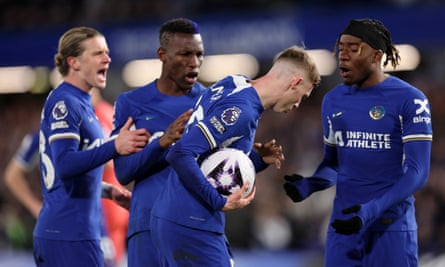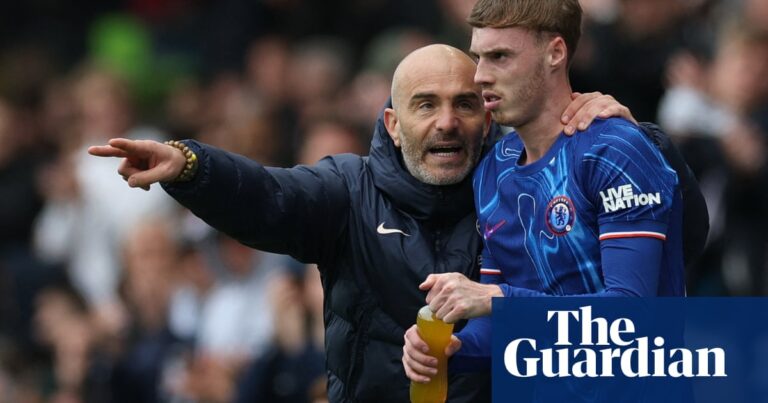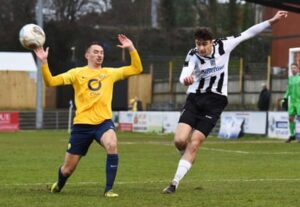The pure poacher’s instinct. The understanding of timing and angles, the striker’s sixth sense for exactly where the ball is going to be, and exactly what he’s going to do with it. The ball is loose in the penalty area, and as Nicolas Jackson swoops in with the late run his eyes are fixed firmly on the target. Which, alas, is wedged under the arm of his teammate Cole Palmer.
“Next time they’re all out,” Mauricio Pochettino fumed after the penalty fracas on Monday night that somehow managed – in true Chelsea fashion – to snatch a PR disaster from the jaws of a thumping 6-0 victory. As for Jackson, the incident with Palmer and Noni Madueke hardened the views of many Chelsea fans against him, which is some considerable achievement in a game where you have also managed a goal and an assist.
Never mind that Michael Ballack and Didier Drogba used to fight over penalties and free-kicks all the time when Frank Lampard was away, that Drogba famously tried to snatch the ball from Lampard on the final day of the 2009-10 season when he was chasing the Golden Boot. That Jackson’s future was even in question here was in many ways a symptom of his curiously fragile status at Chelsea, a career that has barely begun and yet still feels on the brink of ending at any moment.
Jackson signed an eight-year contract last June. Eight years. To put that into perspective, it is a contract that envisages him remaining at Stamford Bridge until he is 30, a contract fully six years longer than that of Pochettino. This is the contract you give to a generational talent, a guaranteed star, a player so indispensable you want to tie him down for life. Or, alternatively, the contract you give a young player with considerable resale value when you want to amortise his transfer fee over the maximum possible length for accounting reasons. At the modern Chelsea it’s always so hard to tell.
After a promising pre-season, Jackson set to work. His goal against Everton on Monday was his 10th of the season in the league: a return comparable with Drogba, Gianfranco Zola or Eden Hazard in their first seasons at Chelsea. On Saturday evening he will play against Manchester City with designs on reaching a second Wembley final of the season.
Of course, there have also been glaring misses, anonymous afternoons, a fiesta of yellow cards. But by any measure this is a decent output for a 22-year-old playing in a new league – and operating, occasionally, out of position – against a prevailing current of pure dysfunctional chaos. And yet it would take the most overactive imagination to envisage Jackson enjoying even a fraction of the success the above forwards had at Chelsea. Why might this be?
Partly, of course, there is a tyranny of expectations there. Playing up front for Chelsea is the sort of job where the memories are long and the patience is short. For every Drogba or Diego Costa who made it, there have been a dozen more who crashed and burned. Talent is not enough. Reputation is not enough. Potential is not enough. After years of flux, this is a fanbase that demands hard, reliable certainties.
Jackson, with the best will in the world, is not that player yet. Ruthlessly quick and relentlessly busy, but still a little gauche and awkward in front of goal, all whirring limbs and ultra-seriousness. Of all the players to have scored more than five goals this season, Jackson has the third-highest deficit between their actual goals (10) and their expected goals (15.22). The caveat is that the two players above him are Erling Haaland and Darwin Núñez. Point being: this can actually work. You just need a functional system around it, and the time to build it.

At which point we run into the first problem. Jackson was never meant to play a whole season on his own up front. However, Christopher Nkunku’s long-term injury changed the landscape and forced Jackson into a starring role in an uneven and evolving team. Fair enough, he’s probably had more time on the pitch than most new Chelsea signings can expect. But this is still learning time, acclimatising time, all the more so for a player with no formal academy schooling, who played without boots until the age of 16, whose entire reputation essentially rests on two lightning months at Villarreal at the end of last season.
after newsletter promotion
Then there is the uncertainty over what his best role is. Having claimed that Jackson can become “one of the greatest strikers in the Premier League” early in the season, Pochettino then moved him to the left wing in the FA Cup game against Aston Villa, arguing that “he needs space to run” and “always plays better when he is facing the goal”. With Nkunku returning to training and a constant rumble of rumours over new forward signings in the summer – Benjamin Sesko, Victor Osimhen, Ivan Toney – the FA Cup semi-final may be Jackson’s last chance to lead the line for Chelsea in a big game, a last chance to prove himself worthy of the shirt he holds.
Which, for all the reasons mentioned above, feels faintly ludicrous. But perhaps this is just how they do business at a club where young players are bought not as talent but as asset: human real estate to be flipped and rented out as appropriate. Where players are signed with no real plan for their development, beyond fattening their value for the next sale: £32m last summer, maybe £45m now, bank that, put it in the accounts.
Can Jackson ever be the player he promises to be? Will he ever be given the time to iron out his flaws, find the outer limits of his talent? We’ll find out in a lot less than eight years.
Source: theguardian.com


















